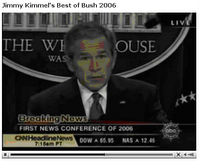26 January 2007
Paul Krugman dropped a great column today...
You see, the nastiness of modern American politics isn’t the result of a random outbreak of bad manners. It’s a symptom of deeper factors — mainly the growing polarization of our economy. And history says that we’ll see a return to bipartisanship only if and when that economic polarization is reversed.
After all, American politics has been nasty in the past. Before the New Deal, America was a nation with a vast gap between the rich and everyone else, and this gap was reflected in a sharp political divide. The Republican Party, in effect, represented the interests of the economic elite, and the Democratic Party, in an often confused way, represented the populist alternative. ...
[T]he G.O.P.’s advantage in money, and the superior organization that money bought, usually allowed it to dominate national politics. ... Then came the New Deal. I urge ... everyone ... who thinks that good will alone is enough to change the tone of our politics — to read the speeches of Franklin Delano Roosevelt...
F.D.R. faced fierce opposition as he created ... Social Security, unemployment insurance, more progressive taxation and beyond ... that helped alleviate inequality. And he didn’t shy away from confrontation.
“We had to struggle,” he declared in 1936, “with the old enemies of peace — business and financial monopoly, speculation, reckless banking, class antagonism, sectionalism, war profiteering. ... Never before in all our history have these forces been so united against one candidate as they stand today. They are unanimous in their hate for me — and I welcome their hatred.”
It was only after F.D.R. had created a more equal society, and the old class warriors of the G.O.P. were replaced by “modern Republicans” who accepted the New Deal, that bipartisanship began to prevail.
The history of the last few decades has basically been the story of the New Deal in reverse. Income inequality has returned to levels not seen since the pre-New Deal era, and so have political divisions in Congress as the Republicans have moved right, once again becoming the party of the economic elite. The signature domestic policy initiatives of the Bush administration have been attempts to undo F.D.R.’s legacy... And a bitter partisan gap has opened up between the G.O.P. and Democrats, who have tried to defend that legacy.
What about the smear campaigns, like Karl Rove’s...? Well, they’re reminiscent of the vicious anti-Catholic propaganda used to defeat Al Smith in 1928: smear tactics are what a well-organized, well-financed party with a fundamentally unpopular domestic agenda uses to change the subject.
So am I calling for partisanship for its own sake? Certainly not. By all means pass legislation, if you can, with plenty of votes from the other party: the Social Security Act of 1935 received 77 Republican votes in the House, about the same as the number of Republicans who recently voted for a minimum wage increase.
But politicians who try to push forward the elements of a new New Deal, especially universal health care, are sure to face the hatred of a large bloc on the right — and they should welcome that hatred, not fear it.
24 January 2007
A fine This Modern World...
 ...from a couple weeks ago. The inanity of the troop surge seems almost like conventional wisdom now, and Tom Tomorrow sums it up with a zing. (click to enlarge)
...from a couple weeks ago. The inanity of the troop surge seems almost like conventional wisdom now, and Tom Tomorrow sums it up with a zing. (click to enlarge)
21 January 2007
On the economics tip...
Asked by Republicans to echo their view that tax cuts lead to increased revenues, Mr. Bernanke said that tax cuts spur economic growth but that they “usually do not pay for themselves” by generating more tax revenue than they drain from the Treasury.
See, in recent months, conservatives have been talking up the fact that the U.S. budget deficit came in much lower than expected for 2006, as big gains in corporate profits and personal income meant that tax receipts swelled, even with lower tax rates. To many, this short-term phenomenon is proof that tax cuts pay for themselves by stimulating economic growth. Bernanke's comments help remind us that this axiom packs about as much intellectual credibility as, say, intelligent design.
16 January 2007
Here's a scoop from The Onion...
Rumsfeld Leaves Most Recent Job Off Resume
"I felt that, in today's job market, the administrative work I did in the 1950s for several congressmen would be especially resonant. Employers these days are looking for practical, versatile skills, not flashy titles."
"'Defense Secretary? Great. Can he type 85 words per minute?' That's what they're thinking," Rumsfeld added.
"What's most important about the last six years is that I discovered what I definitely don't want to be doing," Rumsfeld continued.
11 January 2007
Bush, you bumble-headed boob...
WASHINGTON - Americans overwhelmingly oppose sending more U.S. forces to Iraq, according to a new AP-Ipsos poll that serves as a strong repudiation of President Bush's plan to send another 21,500 troops.
The opposition to boosting troop levels in Iraq reflects growing skepticism that the United States made the right decision in going to war in the first place and that a stable, democratic government can be established there. Just 35 percent think it was right for the United States to go to war, a new low in AP polling and a reversal from two years ago, when two-thirds of Americans thought it was the correct move.
Sixty percent, meanwhile, think it is unlikely that a stable, democratic Iraqi government will be established.
Fully 70 percent of Americans oppose sending more troops, and a like number don't think such an increase would help stabilize the situation there. The telephone survey of 1,002 adults was conducted Monday through Wednesday night, when the president made his speech calling for an increase in troops. News had already surfaced before the polling period that Bush wanted to boost U.S. forces in Iraq. (more from AP here)
08 January 2007
A great montage from Jimmy Kimmel...
 ...featuring some clips of our fearless leader speechifying like only he can. He's the decider, he's read three Shakespeares, and he wants to give you some thoughts about what he's thinking about...click here.
...featuring some clips of our fearless leader speechifying like only he can. He's the decider, he's read three Shakespeares, and he wants to give you some thoughts about what he's thinking about...click here.Post-script: Laughing at him helps ease the pain for a few moments, but when the giggles are finished, the painful reality remains: we're still stuck with this joke of an elder statesman, at least for now.
05 January 2007
Kudos to AfterDowningStreet.org...
* MVP – ACCOUNTABILITY BRANCH
When Russ Feingold moved to censure Bush, the activists of the AfterDowningStreet.org coalition – who had been pushing for the better part of a year for a congressional inquiry into the administration's warping of intelligence to fit its Iraq War goals – adjusted their focus to promote an even broader and more aggressive critique of the Bush presidency.
 Nancy Pelosi may have tried to take impeachment off the table, but the AfterDowningStreet.org crew, led by the indomitable David Swanson, kept forcing it back on. Their coalition's website remains the "go-to" place for the latest on investigations, inquiries, subpoenas, legal actions and every other move to hold this president and vice president to account. And their passion for empowering citizens to promote "impeachment from below" and other accountability initiatives has forged a loose-knit but very real national movement.
Nancy Pelosi may have tried to take impeachment off the table, but the AfterDowningStreet.org crew, led by the indomitable David Swanson, kept forcing it back on. Their coalition's website remains the "go-to" place for the latest on investigations, inquiries, subpoenas, legal actions and every other move to hold this president and vice president to account. And their passion for empowering citizens to promote "impeachment from below" and other accountability initiatives has forged a loose-knit but very real national movement.
Watch for this movement to get a lot more attention in March, when a drive organized by Newfane, Vermont, town selectman and impeachment impresario Dan DeWalt and others will see dozens of town meetings endorse articles of impeachment.
04 January 2007
Good news on capital punishment...
With more scrutiny over capital punishment, death sentences fall to lowest level in 30 years
The number of death sentences handed out in the United States dropped in 2006 to the lowest level since capital punishment was reinstated 30 years ago, reflecting what some experts say is a growing fear that the criminal justice system will make a tragic and irreversible mistake.
Executions fell, too, to the fewest in a decade.
“The death penalty is on the defensive,” said Richard Dieter, director of the Death Penalty Information Center, a Washington organization that looks at problems with the capital punishment system.
Death sentences fell in 2006 to 114 or fewer, according to an estimate from the group. That is down from 128 in 2005, and even lower than the 137 sentences the year after the U.S. Supreme Court reinstated the death penalty in 1976. It is also down sharply from the high of 317 in 1996.
A total of 53 executions were carried out in 2006, down from 60 in 2005. Executions over the past three decades peaked at 98 in 1999.
